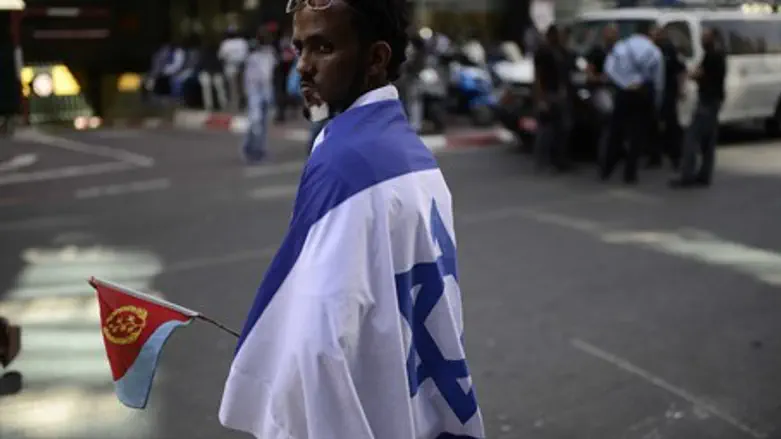
Hundreds of Eritrean asylum-seekers took to the streets near Tel Aviv on Tuesday in support of a UN probe into the African state's regime, considered one of the world's most repressive.
Chanting "dictator out!" and "Viva Geneva!", many wearing blue caps with the United Nations crest, they rallied outside the Israel mission of the European Union, an AFP journalist at the scene reported.
They called on the EU to support the claims of their compatriots seeking asylum in Europe.
Earlier this month the UN Commission of Inquiry (COI) on human rights said the government of Eritrean President Issaias Afeworki is guilty of committing crimes against humanity since independence with up to 400,000 people "enslaved", and should face international justice.
The crimes include systematic enslavement, forcible conscription and other abuses such as rape, persecution and murder, it said.
The UN inquiry was due to report on Tuesday to the Council on Human Rights in Geneva.
"We have come to give our support to this commission of inquiry which has cast light on a fact: Eritrea is a dictatorship where people are killed or disappear," Bluts Iyassu, one of the event's organisers, told AFP.
"There is no free media and we are forcibly drafted into the army," said Iyassu, who has been seeking asylum in Israel for three years.
Since it was established in June 2014, the COI has interviewed more than 800 Eritrean exiles. Eritrea has repeatedly denied UN investigators access to the country.
In May 1991, members of the rebel People's Front for Democracy and Justice led by Afeworki won a 30-year independence war against the Ethiopian regime. On May 24, 1993, Eritrea officially declared its independence.
Since then it has been a one-party state ruled by Afeworki with an iron fist and dissent is not tolerated, said Iyassu, a former teacher who says he spent several years as a political prisoner in the regime's jails.
"He's an absolute dictator, he's a killer," he said.
"For a march like this one we would already be dead in Eritrea."
According to the United Nations, around 5,000 Eritreans risk their lives each month to flee the nation where forcible army conscription can last decades.
Refugees from the Horn of Africa state have in recent years made up one of the largest contingents of people risking the dangerous journey to seek a new life in Europe.
In 2015 more than 47,000 Eritreans sought asylum there and the COI obliges states to grant them refugee status.
They have been taken in mainly by Sweden, Germany, Switzerland and the Netherlands.
According to the UN, some 36,000 are in Israel where they arrived after a perilous overland journey, crossing Egypt and its inhospitable Sinai desert.